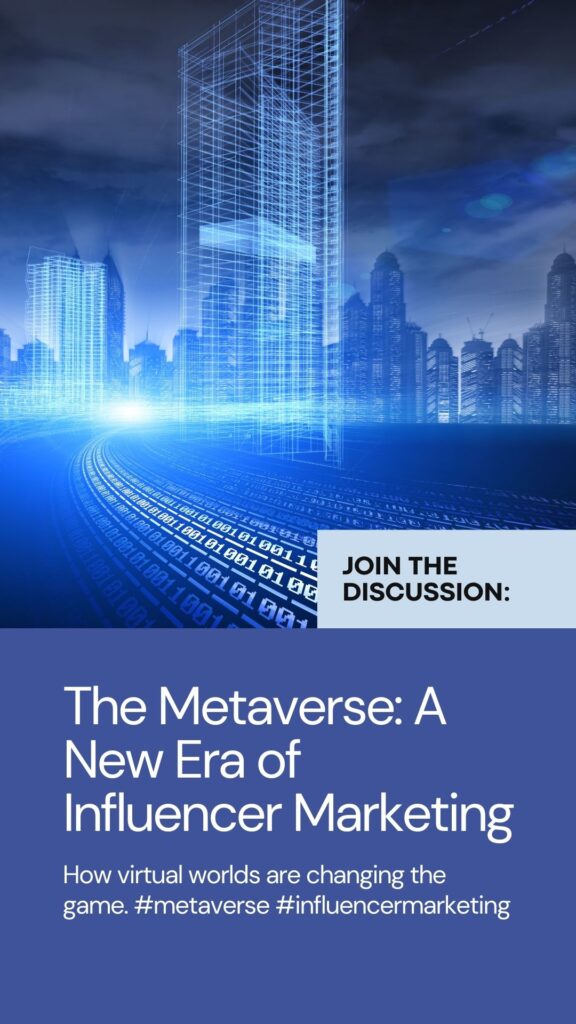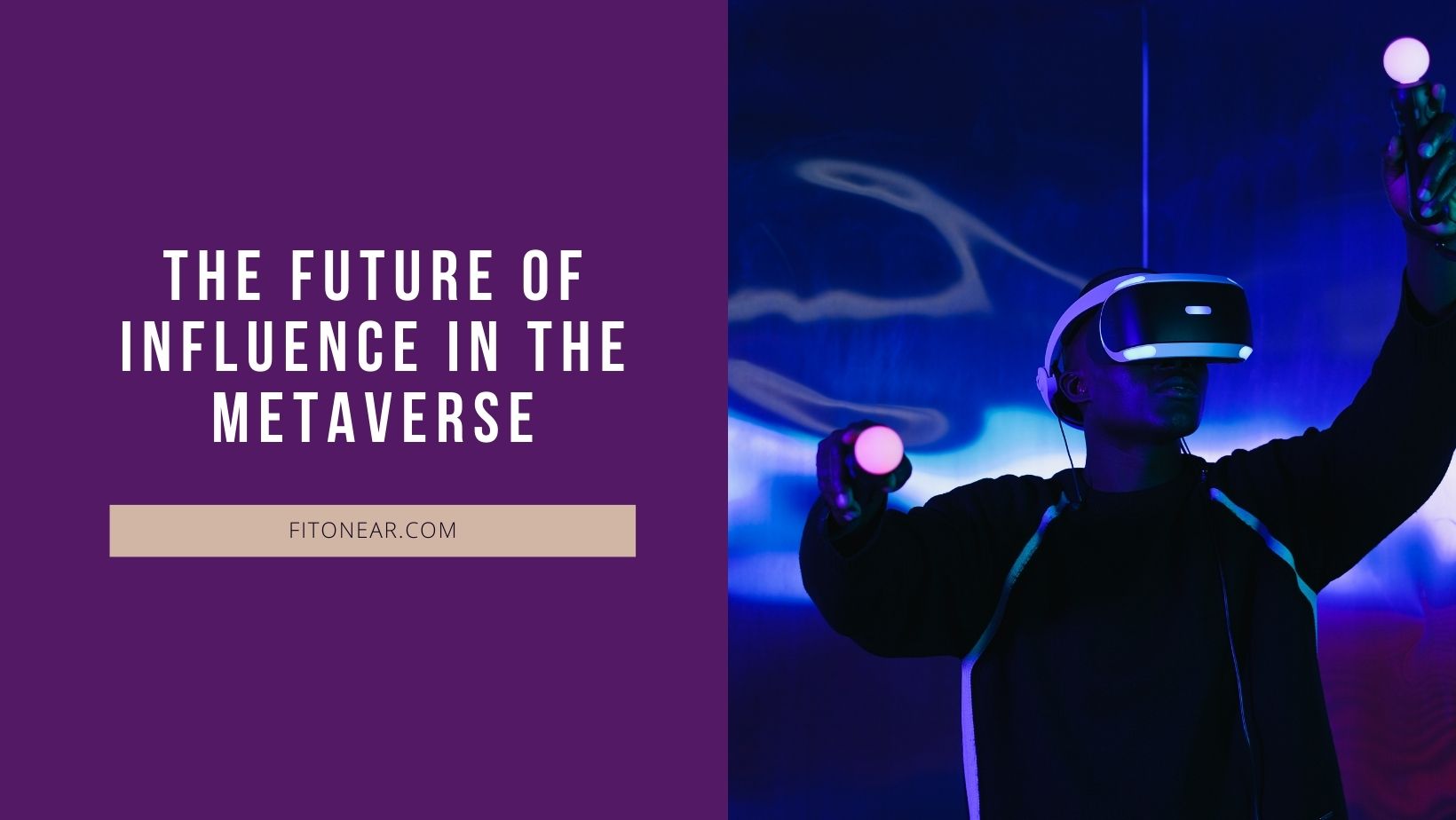As the digital landscape continues to evolve, so too does the world of influencer marketing. The metaverse, a fully immersive virtual reality experience, is emerging as a new platform for brands to connect with consumers in innovative ways. With the potential to create unique and engaging brand experiences, influencer marketing in the metaverse is quickly becoming a key strategy for businesses looking to stay ahead of the curve.
The future of influencer marketing in the metaverse holds endless possibilities. Brands can leverage this digital realm to create immersive experiences and build deeper connections with their audience. By collaborating with influencers in the metaverse, brands can tap into their creativity and reach new audiences in ways that were previously impossible.
You will also love to read “Become a SHEIN Reviewer: An Inspiring Guide on How to Start“

Key Takeaways:
- The metaverse is reshaping the way brands connect with consumers through influencer marketing
- Influencer marketing in the metaverse offers unique opportunities for creative and engaging brand experiences
- Collaborating with virtual influencers is on the rise and offers its own advantages
- Brands need to be mindful of the ethical issues that come with influencer marketing in the metaverse
- Measuring success through meaningful engagement metrics is crucial for any influencer marketing campaign in the metaverse
Understanding the Metaverse and its Impact on Marketing
Have you heard of the metaverse? It’s the latest buzzword in the tech industry and it’s rapidly gaining traction. But what exactly is it and how does it impact marketing? Let’s delve into the world of the metaverse and explore its significance for brands.
The metaverse refers to a virtual world where users can interact with each other and digital objects in a simulated environment. It’s not a new concept, but recent advancements in technology have made it more accessible and immersive than ever before. As a result, brands are starting to take notice.
The impact of the metaverse on marketing is significant. It’s a new frontier for brands to connect with consumers and the opportunities for innovation are endless. In the metaverse, brands can create immersive experiences that go beyond traditional advertising methods. They can engage with consumers in a more meaningful way, building stronger relationships and brand loyalty.
“The metaverse is the next generation of the internet, and it’s going to change the way we interact with brands and each other.”
The rise of the metaverse also means new opportunities for influencer marketing. Brands can collaborate with virtual influencers and leverage their creativity and authenticity to connect with consumers in a way that feels more genuine.
Overall, the metaverse is reshaping the way brands approach marketing. It’s a new frontier that offers endless possibilities for innovation and engagement. As a brand, it’s important to stay on top of this trend and explore the potential that the metaverse holds for your marketing strategy.
The Rise of Virtual Influencers
As the metaverse gains traction, virtual influencers are becoming more prevalent in digital marketing. These computer-generated personalities offer a unique advantage to brands in terms of authenticity and creativity. Virtual influencers are not limited by the constraints of reality, and their ability to showcase products and services in imaginative ways can capture the attention of consumers like never before.
One of the biggest advantages of virtual influencers is their ability to create a sense of immersion for users. Because they exist within the virtual world, they offer a level of engagement that is not always possible with human influencers. Virtual influencers can interact with users in ways that feel more personal and unique, leading to a greater sense of brand loyalty and advocacy.
“Virtual influencers offer a unique advantage to brands in terms of authenticity and creativity. These computer-generated personalities are not limited by the constraints of reality, and their ability to showcase products and services in imaginative ways can capture the attention of consumers like never before.”
Virtual influencers can also help bridge the gap between brands and younger consumers who are more likely to be digital natives. These influencers often have large followings on platforms like Instagram and TikTok, making them an ideal choice for brands looking to reach this demographic.
However, the use of virtual influencers does raise some ethical concerns. Brands must be transparent about the fact that they are using computer-generated personalities and ensure that their followers are aware of this fact. Virtual influencers should also be held to the same standards of authenticity and responsibility as human influencers, given their ability to influence purchasing decisions.
The rise of virtual influencers is a trend that is set to continue as more brands experiment with the potential of the metaverse. As this digital realm evolves, virtual influencers may become an increasingly important part of digital marketing strategies, offering brands new opportunities for engagement and innovation.
The Rise of Virtual Influencers
With the advent of the metaverse, virtual influencers have become an increasingly popular trend in influencer marketing. These computer-generated influencers offer a unique advantage in terms of authenticity and creativity, as they are not bound by the same limitations as human influencers. They can be customized to suit the needs of the brand and can offer a level of flexibility that is not possible with human influencers.
Virtual influencers are gaining popularity among brands as they offer a new way to connect with audiences and to engage with them in ways that were not possible before. They can be used to promote products or services, or to raise awareness about a particular cause.
However, the rise of virtual influencers has also raised ethical concerns in the metaverse. There are questions about transparency and disclosure, and the need for responsible brand partnerships. It is important for brands to be transparent and to disclose when a virtual influencer is being used to promote a product or service. This will help to build trust with the audience and to avoid any potential backlash.
Brands must also be aware of the potential for virtual influencers to be used in inappropriate ways. Virtual influencers can be created to look like real people, and there is a risk that they could be used to promote harmful or offensive messages. It is important for brands to vet their virtual influencers carefully and to ensure that they align with their values and ethos.
In conclusion, virtual influencers offer a unique opportunity for brands in the metaverse, but they also present ethical considerations that should not be overlooked. Brands must be transparent and responsible in their use of virtual influencers and should carefully consider whether they are the right fit for their marketing goals.
Innovative Engagement Strategies for Brands in the Metaverse
The metaverse offers a unique digital realm for brands to engage with their audience in innovative and immersive ways. Here are some engagement strategies that you can adopt to enhance your brand-consumer interactions:
Immersive Experiences
The metaverse provides a perfect platform for creating immersive experiences that transport your consumers to a new dimension. You can create 3D environments that showcase your products or services and enable consumers to interact with them in real-time. For example, you can create a virtual store where your consumers can browse and purchase your products or attend a virtual event that showcases your brand’s values and vision.
Interactive Events
Interactive events are a great way to engage with your audience and create a sense of community around your brand. You can host virtual events such as concerts, live streams, or product launches that enable your consumers to connect with each other and your brand. You can also organize challenges or competitions that encourage your consumers to participate and win rewards, creating a sense of excitement and engagement.
Gamification Techniques
Gamification techniques can help you enhance your consumer engagement and create a sense of fun around your brand. You can create games or quizzes that are related to your brand and offer rewards to the winners. You can also integrate game mechanics into your marketing campaigns, such as points or badges, to encourage continued engagement and loyalty.
By adopting these engagement strategies, you can create meaningful connections with your audience in the metaverse and enhance your brand’s reputation and visibility.
Measuring Success in the Metaverse: Metrics and Analytics
In the metaverse, influencer marketing can be a powerful tool for brands to engage with their audience in innovative ways. However, it is essential to measure the effectiveness of your campaigns to make data-driven decisions for future campaigns.
One of the key metrics to track is the reach of your campaign. This includes the number of people who viewed your campaign, engaged with it, and shared it with others. Pay special attention to the engagement rate, which indicates the percentage of people who engaged with your campaign out of those who viewed it. It is also essential to track the conversion rate, i.e., the percentage of people who took the desired action, such as buying a product or subscribing to a service, after seeing your campaign.
Analytics tools such as Google Analytics, Hootsuite Insights, or Sprout Social can help you track and evaluate your metrics effectively. Google Analytics can help you measure the traffic on your website, including referral traffic and social media traffic. Hootsuite Insights can help you track campaign mentions and engage with your audience in real-time. Sprout Social provides comprehensive social media analytics, including engagement metrics and demographics data.
“Measuring the effectiveness of your influencer marketing campaigns in the metaverse is crucial to making data-driven decisions for future campaigns.”
In addition to these metrics, it is essential to monitor user-generated content (UGC). UGC can help you understand the sentiment and perception of your brand, as well as the impact of your campaign on your audience. You can track UGC using social media listening tools such as Brandwatch, Talkwalker, or Mention. These tools can help you track brand mentions and hashtags and analyze sentiment and engagement data.
Finally, it is crucial to track your ROI (Return on Investment) for your influencer marketing campaigns in the metaverse. You need to evaluate the cost of your campaign versus the revenue generated and the impact on brand awareness, customer engagement, and loyalty.
By tracking these metrics and analytics, you can measure the effectiveness of your influencer marketing campaigns in the metaverse and optimize your strategies for better outcomes.
The Conclusion: Embrace the Future of Influencer Marketing in the Metaverse
Congratulations! You have reached the end of our article on the future of influencer marketing in the metaverse. We hope that you have gained a better understanding of this emerging landscape and the potential it holds for brands and consumers alike.
As we have discussed throughout this article, the metaverse presents a unique opportunity for brands to connect with their audiences in innovative and engaging ways. From virtual influencers to immersive experiences and interactive events, there are endless possibilities to explore.
However, as with any new technology or platform, it is important to navigate the ethical considerations that arise. Transparency, disclosure, and responsible brand partnerships are crucial to building trust and credibility in the metaverse.
Ultimately, success in the metaverse will be driven by data-driven decisions and the ability to measure the effectiveness of influencer marketing campaigns. By leveraging metrics and analytics, brands can evaluate their performance and make informed decisions for future campaigns.
Embrace the Possibilities
As the world continues to evolve and technology advances, it is crucial for brands to stay ahead of the curve and embrace new possibilities for engagement. The metaverse represents a significant shift in the marketing landscape, and those who are able to adapt and innovate will be well positioned for success.
We encourage you to explore the metaverse and experiment with different strategies for influencer marketing. Embrace the potential of this digital realm and discover new ways to connect with your audience.
Thank you for reading, and we wish you the best of luck in your future endeavors in the metaverse!
